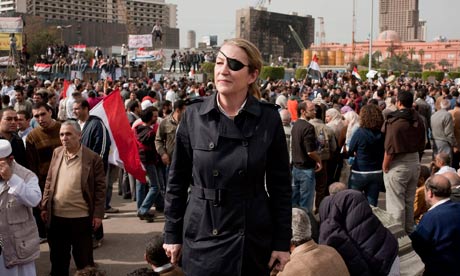
To read a great newspaper reporter's work in a collected volume is entirely different from the cumulative effect of the articles over time. One gets a sense – perhaps a false one – of coherence, or even teleological destination, though of course there is none. And to read that work when the eyewitness was a friend recently killed while trying to continue, if not complete, the narrative is downright surreal.
I had a strange friendship with Marie Colvin, if that is what it was. The Middle East was her fiefdom; I was an interloper – twice: Iraq both times around, 1991 and 2003. She was writing for the Sunday Times, I for the Observer. During the crucial, immediate aftermath of the 2003 invasion, Marie was embedded (in his compound) with the Iraqi dissident Ahmed Chalabi, who had done so much to take the Anglo-American axis to war. With the Sunday Times "in the bag" for the invasion, I had been doing all I could to counter Chalabi's influence on this newspaper, which I saw as deceptive and catastrophic.
And so Marie and I would eyeball each other through the Mesopotamian dusk, buy each other drinks – that waltz rivals dance when discussing the week's work over mezze. But knowing all along that what binds you is stronger than what divides you.
Here it all is, a vast Marie Colvin box set, poignant beyond words. It says on the back cover that Marie "believed in the pursuit of truth, and the courage and humanity of reporting", but I can't imagine her putting it like that. Marie was the greatest artisan war reporter: unlike most of us, she did almost nothing else but this insane metier. There was no "time out" to write a concert review or a piece about being Irish-American, or a glance across her adoptive Britain.
And when her articles between 1986 and the appalling last assignment in Syria come together in a book, the whole is suddenly greater than the sum of the parts. One realises that no one else entwined the powerful pieces and the pawns on war's chessboard quite like Marie (most of us specialise in one or the other): Gaddafi's son and the university student press-ganged into fighting for the Libyan dictator share a column.
Above all, the book captures the dramatis personae of her work. Here is Latif Yahia, tortured into having cosmetic surgery so as to live as Uday Hussein's body double. Here are the small people who make big history, such as Sasson Shem-Tov, who cares not a fig for politics, but is about to order a fleet of bulldozers to eradicate Palestinian houses in East Jerusalem. Here is the girl from Kosovo who returns to find the remains of her family in plastic bags, and the Libyan soldier who coolly describes how he and his comrades carried out an order to rape four sisters in a house they had broken into: "She did not move much when I raped her."
There is the epic adventure of Marie herself: clambering over mountains to escape Chechnya. There is her controversial apologia for Guantánamo Bay and her capacity to say so much with so few words: "Stunned and dusty in this new world, returning Palestinians wandered around a moonscape the size of two football pitches" – the Jenin refugee camp after the bloodbath in 2002.
We are told at the start that Marie paid the "ultimate price". A shot of martyrdom runs through this language that I don't think she would have liked. I remember having a conversation with her at the Frontline club and warning her: "If you keep doing this, you stack the odds against you." She was scoffing, more than slightly, at the fact that I'd quit this caper after four months in the Mexican drug war. This stuff is like heroin, I told her, and like heroin, it kills you in the end.
Therein lies the anger as one reads her last, marvellous paragraphs about Syrian first lady Asma Assad's schooldays in Acton, and a line she sent from Homs, quoted by her colleague Jon Swain in his heartbreakingly restrained account of the end: "I think the reports of my survival may be exaggerated."

